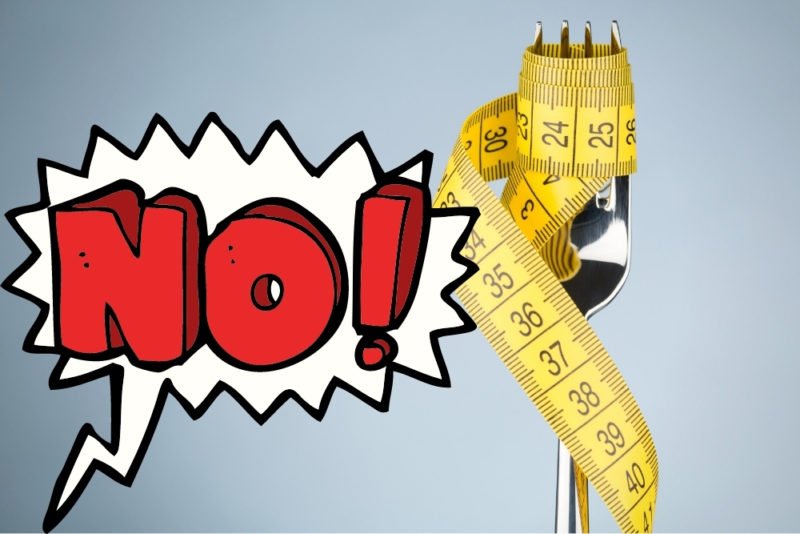
Thursday is no-diet day. Why not make it “no more diets” day? If you’ve been thinking about saying, “Bye, bye, don’t let the door hit you on the way out” to diets, May 6 is certainly as good as any day to start.
I suggest setting the stage by taking an inventory of every diet you’ve ever been on, to the best of your recollection. This includes “formal” weight loss programs, meal plans from magazines, diet books you followed, times you decided to buckle down and start counting calories or macros on your own. Also include plans that were primarily “for health” but kinda sorta promised you that you will also lose weight. As you do this inventory, ask yourself:
- How much weight did you lose on each round of dieting?
- How much did you gain back?
- Did you gain back more than you lost?
- How did that make you feel?

Looking at your dieting ledger
What has dieting cost you? I’m not just talking about money. Sure, roughly tally up what you’ve spent on commercial weight loss programs, calorie- or macro-tracking apps, books promoting weight loss, and joyless exercise classes designed to “burn calories.” But I’m also talking about time spent planning a dieting, figuring out what you could or couldn’t eat, time spent in a guilt spiral because you ate a “forbidden” food.
Also factor in losses. This includes social occasions you skipped out on while you were dieting because “there’s nothing there I can eat.” It also includes social occasions you missed because you had regained weight felt ashamed, and just wanted to hide.
Add in social occasions that you attended physically, but were absent mentally because you were fixated on what you would eat, or shouldn’t eat, or whether people were judging you. Also factor in things you postponed until you lost weight, such as trips, dating, asking for a raise, applying for a better job.

Impacts on health
Dieting is not a benign endeavor. Not only does dieting not lead to lasting weight loss for the overwhelming majority of people, but there’s no consistent evidence that it improves health. In fact, it often has negative effects on health.
Strict, restrictive diets and excessive exercise can harm physical health, but any form of dieting can harm mental health when it involves restriction and leads to a cycle of weight loss, weight regain, repeat, repeat. It can also “ruin” perfectly nurturing behaviors like meal planning and physical activity, because they become associated with dieting, deprivation and despair. A few questions to ask yourself about how dieting may have affected your relationship with movement:
- How often did you participate in a form of exercise that you didn’t like because you thought it would help you lose weight?
- How often did you stop engaging in ANY physical activity, even types you would actually enjoy, because exercising to lose weight “didn’t work,” so what was the point?
- How often did you stop exercising because you regained weight, felt ashamed, and didn’t want to be seen?
One major contributor to health is access to healthcare, including preventive healthcare. But research has amply demonstrated that weight stigma, whether directed towards you by others or directed at you by yourself (internalized weight stigma) is a major barrier to getting this care.
Looking back, ask yourself this question: How many times did you avoid going to the doctor because last time you were there you had lost weight and were praised, but then you regained weight and didn’t want your doctor to know? Or maybe you had gained weight before your last visit, and your doctor’s prescription to “eat less and exercise more” didn’t yield any weight loss?
Yes, eating better and moving your body may have a positive effect on health, but you can do both of these things without trying to shrink your body.

Relationships and pleasure
There’s a cartoon that shows two women sitting in a restaurant, and one woman says, “Every time I go on a diet I lose my mind. Unfortunately, it doesn’t weigh very much.” I’ve had client after client tell me how they become awful humans when they’re dieting. Recently, a client told me that when she was about to start a new diet, she actually warned friends and family that she would be really cranky.
How many times did you snap at someone you loved because you were hungry all the time? How many times did you beat yourself up because you ate an entire box or pan of something because you were hungry all the time and just couldn’t take it anymore?
What might your life have been like if:
- You spent your time, money and effort not on dieting, but on engaging in hobbies and other pursuits that brought you real purpose and joy?
- If you were truly able to be present with friends and family because you weren’t fixated on food and the size or shape of your body?
- If you took that dream trip to Paris or Costa Rica rather than waiting until you made your body smaller.
Hmmmm….these sound like things that you can also add to the list of “what dieting has cost me.”

The other side of dieting
If reflecting on the questions in this post brings up any shame or guilt of the “Why did I waste so much time dieting? Why did I give up so much of my life?” variety, stop, breathe, and rest your hand on your heart. With this gentle touch, show yourself some self-compassion.
Of course you dieted. That’s what we’re taught to do. That’s what we’re taught that we’re supposed to do. Losing weight and keeping it off (which most mere mortals simply can’t do) is held up of one of the highest levels of achievement, especially for women. Think about how proud and successful you’ve felt when the number on the scale has been on a downward trend. And then the other shoe drops, the number on the scale starts rising, and you feel like an utter failure.
Well, you’re not a failure, you’ve simply been swimming in diet culture, and that water is decidedly NOT fine. You are so much more than a number, whether that’s a number on a scale or a clothing label. Is it time to stop letting diet culture steal you from you?
Disclaimer: All information provided here is of a general nature and is furnished only for educational purposes. This information is not to be taken as medical or other health advice pertaining to an individual’s specific health or medical condition. You agree that the use of this information is at your own risk.
Hi, I’m Carrie Dennett, MPH, RDN, a weight-inclusive registered dietitian, nutrition therapist and body image counselor. I offer compassionate, individualized care for adults of all ages, shapes, sizes and genders who want to break free from eating disorders, disordered eating or chronic dieting. If you need to learn how to manage IBS symptoms with food, or improve your nutrition and lifestyle habits to help manage a current health concern or simply support your overall health and well-being, I help people with that, too.
Need 1-on-1 help for your nutrition, eating, or body image concerns? Schedule a free 20-minute Discovery Call to talk about how I can help you and explore if we’re a good fit! I’m in-network with Regence BCBS, FirstChoice Health and Providence Health Plan, and can bill Blue Cross and/or Blue Shield insurances in many states. If I don’t take your insurance, I can help you seek reimbursement on your own. To learn more, explore my insurance and services areas page.






